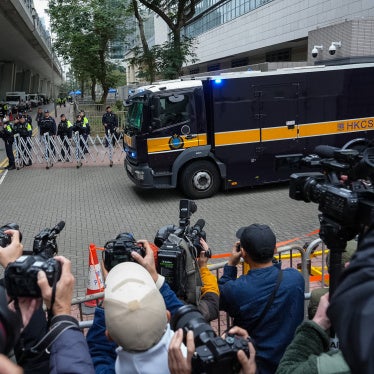The Chinese government has a talent for producing precisely the outcome it doesn’t want: whether it’s repressing religion, culture, and expression in Xinjiang so much that tensions now run extremely high, restricting the space for helpful civic groups such that they find it difficult to operate or imprisoning some of its most constructive critics, stifling opportunities for peaceful debate and progress.
The recent developments in Hong Kong fit the pattern. On August 31, China’s top legislative body, the National People’s Congress Standing Committee (NPCSC) handed down its decision: no real democracy for Hong Kong for the near future, and those who most passionately “love Hong Kong and love China” – but don’t love the Chinese Communist Party – will never be allowed to lead the territory’s government.
While that policy finally enables all eligible Hong Kong voters to cast a ballot for the territory’s Chief Executive, it has a catch: they can only vote for candidates approved by Beijing, and candidates must now be approved by more than half the members of a committee stacked with Beijing loyalists. These decisions undermine Beijing’s promise of universal suffrage to Hong Kong, written in the territory’s mini-constitution the Basic Law.
Beijing’s basic desire for Hong Kong since its 1997 return from British sovereignty has revolved around the territory’s political quiescence and economic vigor. Beijing has known it would have to tolerate the degree of civil liberties existing at that time, which exceed those available to people on the mainland. But as the people of Hong Kong pushed for the promised democratic rights, Beijing reacted by doing what it does with the rest of the mainland: blatantly rejecting international treaty obligations to respect political rights, deploying rusty but threatening rhetoric opposing peaceful free expression, rigging public consultations and then claiming the results represent “mainstream opinion,” distorting Hong Kong’s domestic desires for greater political rights as dangerous “foreign interferences,” and even making a show of military hardware where it is manifestly not needed.
These missteps have created exactly what Beijing doesn’t want: Occupy Central activists vowing to peacefully blockade traffic in the heart of Hong Kong, a united pan-democratic opposition, and Hong Kong legislators pledging to reject Beijing’s proposals. In other words, Beijing has created a protracted crisis precisely where it didn’t want one.
Beijing has made its hostility towards democracy in Hong Kong clear. But governments and organizations that claim to promote democracy worldwide – from US President Barack Obama to British Prime Minister David Cameron to UN Secretary General Ban-ki Moon – have an obligation to challenge this outcome and help keep hope alive amongst those who have struggled for so long to maintain and expand political space in the mainland and in Hong Kong.






